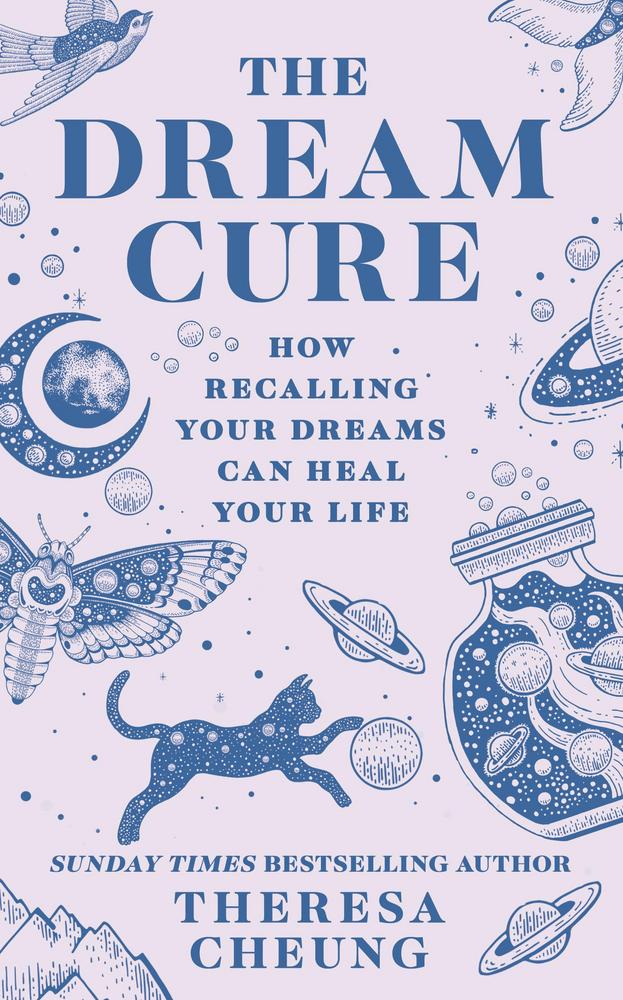- Home
- Editor's Notes
- Current Issue
- Riki Reflects
- Spiritual Traveler
- Starz Emporium
- Classifieds
- Advertise with Us
- Submissions
- Awards
- About Us
- Contact Us
The Dream Cure
By Theresa Cheung
 Why do you dream at night?
Extracted from the Dream Cure: How Recalling Your Dreams Can Heal your Life By Theresa Cheung Why Dream? There are several credible theories about why we dream, and a great deal of research has been done, but there is no definite explanation, yet. Despite the best efforts of scientists to define them, much like the rest of the human brain or the nature of consciousness itself, dreams remain an enticing enigma. The only majority opinion is that we all dream at least five or six times every night – dreams illustrate what unites rather than divides humanity. Brain scans show that those who say they don’t dream do. They just don’t remember their dreams. The study and science of dreams is called oneirology. There is so much yet to learn, but the more we learn about dreams – what they are, why we have them, what they mean – the more we learn about who we are, why we are here and what the meaning of our mysterious lives might be. And the more we learn about their potential healing power. The long-held notion that dreams are simply random and nonsensical firings of the brain persists, but in recent years there has been a growing acknowledgement among scientists that dreams do have a role to play in holistic well-being. Indeed, extreme anxiety occurs if subjects are deprived of REM sleep – the rapid eye movement stage when most, but not all, dreaming occurs. This is a promising sign that, although we don’t really know why, dreaming is good for us, emotionally, psychological and physically. In ancient times it was thought that dreams were from another dimension. Some continue to believe this, but most dream experts, me included, now believe that dreams come from our unconscious – that they are thoughts, feelings and impulses that have not been noticed or expressed in waking life. In this way, dreams are like an inner therapist, allowing the dreamer to brainstorm connections, learn about what matters to them and face and deal with unresolved feelings and thoughts to achieve inner peace. In addition to being highly cathartic and therapeutic, dreams offer a nightly simulation experience where you can safely rehearse skills or ‘act out’ worst-case scenarios so you are better prepared to cope in your waking life. They also help you make sense of all the information you encounter in your day, and are therefore vital for brain health, memory consolidation and learning. Not to mention dreams aid problem-solving and ignite serious creativity. If you have ever woken up in the morning with illumination, chances are it has been because a dream has been working silently behind the scenes to inspire you. Indeed, visions in dreams have been responsible for world-changing theories, inventions and works of art. Many of us don’t consider ourselves visionary in waking life, but dreams show that when we fall asleep, we are true visionaries. In a nutshell, there are many ‘whys’ rather than one single ‘why’ we dream, and all of them work synergistically, the uniting factor being that an active dream life is connected to an active brain and holistic health and well-being. Scientists, most notably Matthew Walker, professor of psychology and neuroscience at the University of California, Berkeley, and numerous peer-reviewed studies are rapidly concluding that dreaming could be as important for our heath as food, drink and the air we breathe. Indeed, according to a 2017 review about dreaming published in the Annals of the New York Academy of Sciences, lack of REM (dreaming) sleep, rather than poor sleep, is responsible for many emotional and health problems. Your Sleeping Brain To understand dreams better, scientists study the place of their origin – the brain – and what parts of the brain remain ‘awake’ when a person falls asleep. When you are sleeping, your limbic or emotional, intuitive brain centres become more active than the logical, rational brain centres. This makes sense, as when you wake up, it is the feelings of your dream that you are likely to recall first, rather than the scenarios. The absence of waking logic and reason allows the suspension of disbelief and explains why in the dream state the bizarre feels normal and you can make creative connections your waking logic wouldn’t allow you to even contemplate. Intriguingly, research also indicates that during REM sleep, noradrenaline, a fight-or-flight hormone like adrenaline, is absent. In the other sleep stages and the waking state, it is present. This is significant because with no noradrenaline and the limbic parts of the brain active, the dreaming mind can conjure up scenarios and process information in a way that feels both natural and stress-free. In the safety of a dream, the brain can process trauma without the risk of emotional pain. As well as differences between the dreaming and waking brain, scientists also look for similarities. One of those is the brain activity involved in facial recognition. It seems that dreaming of a face activates the same part of the brain as recognizing a face when you are awake. All this research into the dreaming brain and how it differs from or compares to the waking brain is exciting, because it helps us understand the nature of consciousness better. It also suggests that while dreams are certainly influenced by waking reality, they aren’t entirely created by it. Something healing happens in the dreaming state that can’t yet be explained. You sleep perchance to dream In addition to studying the dreaming brain, scientists also study the place where dreams begin – sleep. Guess what? In much the same way that they don’t really know why we dream, they don’t really know why we sleep either. They have many theories about the whys of sleep, but the only thing they can agree on is that sleep is essential for survival. If we are completely sleep-deprived, death will follow. You probably think that you sleep because you need to rest and rejuvenate, and while rejuvenation does happen on a physical level when you sleep, rest doesn’t. Your body remains active while you sleep, with twitching movements, and your brain, of course, remains active in the dreaming state. Given the proven holistic healing benefits of dreaming, in my humble opinion the reason we sleep is because we urgently need to connect to the healing power of our dreaming mind. Once you understand how to work with them your dreams can heal your life. END |
Share this article with friends!
|
Copyright © 1998 - 2025 Mystic Living Today All rights, including copyright, in the content of these Mystic Living Today web pages are owned or controlled for these purposes by Planet Starz, Inc. Terms of Service Disclaimer and Legal Information For questions or comment, contact Starzcast@mysticlivingtoday.com. Reproduction of this page in any form is not allowed without permission of the author and the owner of this site. All material on this web site, including text, photographs, graphics, code and/or software, are protected by international copyright and trademark laws. Unauthorized use is not permitted. You may not modify, copy, reproduce, republish, upload, post, transmit or distribute, in any manner, the material on this web site. Unless permissions is granted. |



